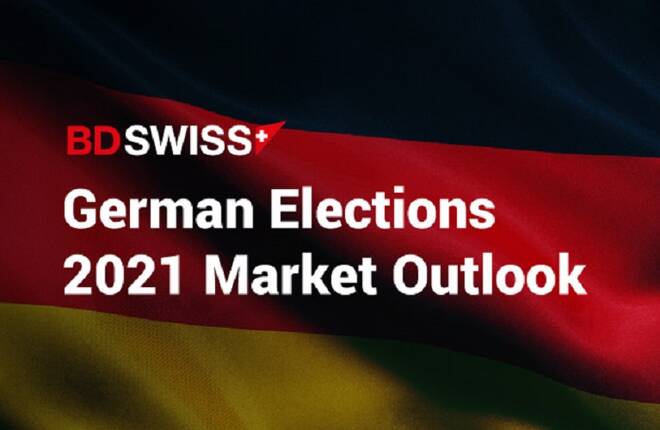German Elections 2021 Market Outlook Report
By:
With the German Elections looming, traders are already attempting to identify the biggest potential winners and losers in the forex and EU stock markets.
Veteran fundamental analyst and Head of Investment Research at BDSwiss Marshall Gittler shares his insights, views and projections on the possible impact of the German Elections on the EUR forex pairs and other markets.
All eyes on the German Elections
The German federal election will take place on Sep. 26th. This is the first such election in 16 years that won’t have Angela Merkel on the ballot. It will elect a new leader for Germany and in effect a new leader for the European Union. Will German policies change dramatically after 16 years under Merkel? As Germany is the pivotal economy in Europe, accounting for nearly 30% of Eurozone GDP, its future strongly influences the continent and the currency. In this piece, I’d like to explore the likely winner(s) of the election and what they might mean for Europe and the world at large.
There will be six political parties contesting the election. Germany’s electoral system makes it difficult for any one party to form a government on its own, meaning that coalition governments tend to be the rule. The key to predicting the election then is to predict which parties are likely to form a coalition.
Where do we stand?
The polls show the CDU/CSU well ahead, but with the Greens, rather than the SPD, in second place. As usual, no party is likely to be in a position to govern by itself. The focus, therefore, is on what parties might form a coalition and how they need to compromise in a coalition that might affect their policies.
The possible coalition combinations are often referred to by the pattern that their colours would make.
Currently, the only two-party coalition possible seems to be the CDU/CSU and the Greens (the so-called “black/green” coalition). This is the most likely outcome of the election at the moment. These two parties have similar views on infrastructure investment, social policies, and climate change, although the Greens are more aggressive on the latter issue.
However, they have serious differences in fiscal and EU policy. The CDU/CSU doesn’t want any tax hikes and wants to keep the debt brake and balanced budget target, while it rejects the idea of an EU debt union and wants to keep the Stability and Growth Pact (SGP) rules limiting countries’ budget deficits. The Greens on the other hand want a wealth tax, higher taxes for the top income earners, want to make the debt break more flexible, and support a common EU fiscal policy and reform of the SGP. This is one of the main areas of difference that’s important to the euro.
Market Implications:
Bundestag elections are held around the same time in September. If we look at how EUR/USD behaved from the beginning of August until mid-November, we see that in general EUR/USD has risen (i.e. EUR has strengthened) going into the election, then weakened immediately after. This probably reflects a typical “buy the rumour, sell the fact” reaction: investors buying EUR in anticipation that Merkel will win, then taking profits after she does.
At the moment, US fiscal policy is making a bigger contribution to growth there than EU fiscal policy is, but in coming years as the US winds down its extraordinary policies and the EU’s NGEU fund continues to disburse funds, the EU’s fiscal contraction should be less acute than the US’. That may be one-factor supporting EUR/USD. If however, Germany goes back to ploughing the furrow of Teutonic rectitude, EU growth could slow and EUR/USD move still lower.
How to access the full report:
Keeping current on important news is now more critical than ever. If there’s anything that the events of 2020 have taught us, it is that market opportunities can arise from the most unexpected and unlikely circumstances. The difficult part is sorting through all of the available news to get to the updates that are most salient to your investment portfolio.
BDSwiss simplifies this process by offering targeted, timely, and actionable research and information on different asset classes and market sessions through a series of live webinars, daily analysis articles, weekly outlooks, real-time trading alerts and of course special reports on major market movers such as the German Elections. Visit bdswiss.group to access Marshall Gittler’s full German Elections Report and get a complete breakdown of what we can expect from the markets before and after the elections.
About the Author
Marshall Gittlercontributor
Marshall Gittler is an expert in the field of fundamental analysis, with over 30 years’ experience undertaking top-level research of the financial markets.
Advertisement
